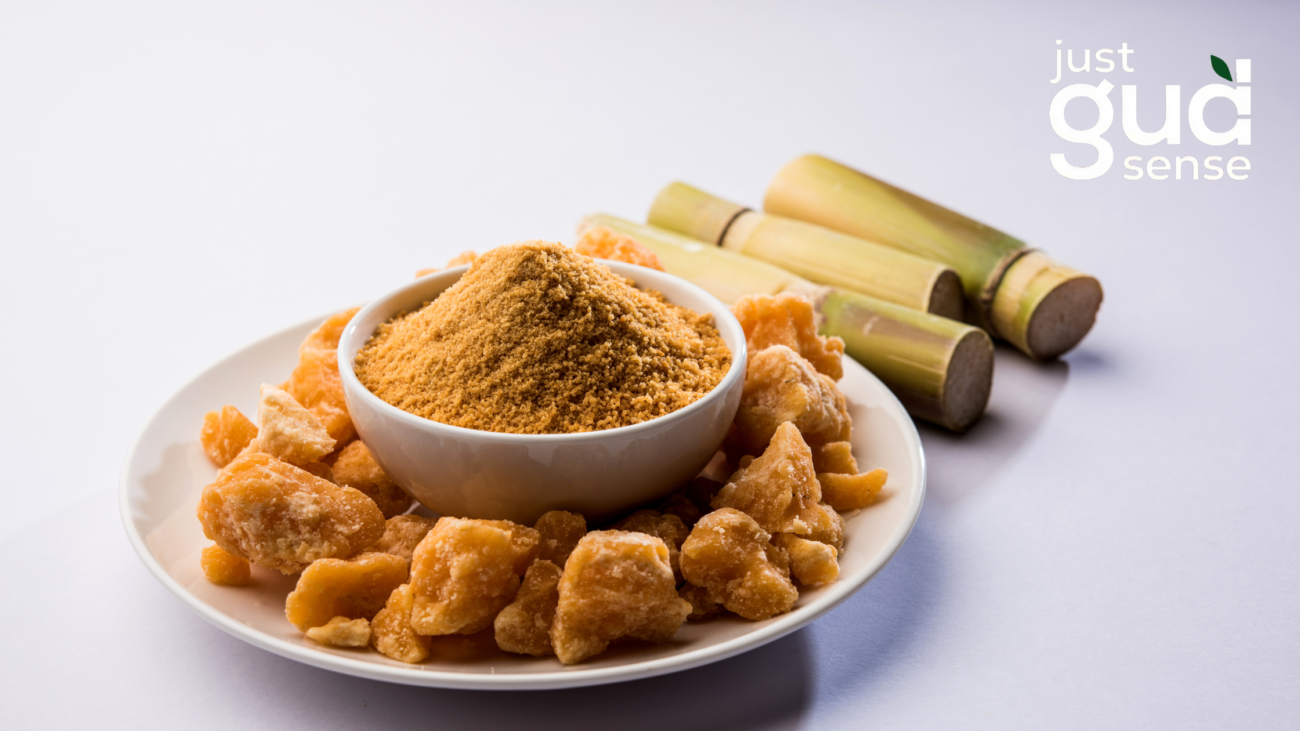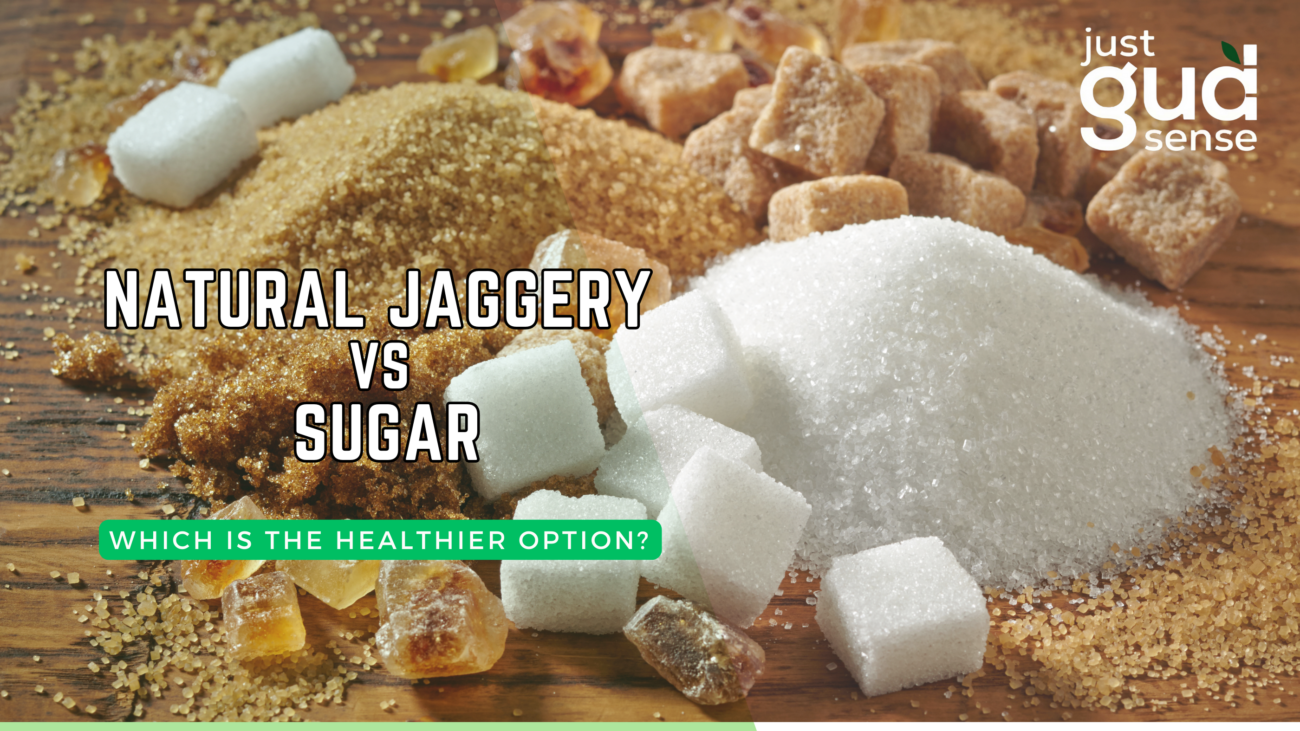
Blog
Is Natural Jaggery the Sweetener of the Future? Here’s What the Research Says
Ever caught yourself eyeing that sugar jar, wishing you could enjoy something sweet without that little voice whispering, “Maybe not?” Whether you’re chasing healthier habits or just want better choices for your family, you’re not alone. We all love our treats, but all the talk about sugar’s downsides can make dessert feel like a guilty pleasure.
Many of us are looking for tasty alternatives that bring something extra to the table besides just calories. You might have heard whispers about natural jaggery – the traditional, unrefined, healthy sweetener gaining attention in health circles. But is it a healthier hero, or just another food trend blowing through?
If you’re someone who likes to know the why behind things, who appreciates facts over fads, and who wants to understand what science truly says about our food, you’re in the right spot. We’re going to walk through the real data, unraveling the complexities of natural jaggery. By the end of this, you’ll have a clear understanding of what natural jaggery brings or organic jaggery to your plate, how it stacks up against traditional sugar, the Jaggery vs. Sugar conversation, and whether it deserves a permanent spot in your pantry. Let’s get into it. The Jaggery Health Benefits make this exploration valuable.

What Exactly Is Natural Jaggery? A Quick Rundown
Before we talk about its potential benefits, let’s get on the same page about what natural jaggery is. Unlike your everyday white sugar, which undergoes heavy processing to strip away everything but pure sucrose, organic jaggery is different. We knew it as “gur” or “panela.” It’s a natural, unprocessed healthy sweetener, primarily produced by boiling down the juice extracted from sugarcane or palm sap until it reaches a thick and solid consistency… Think of it as sugar in its more original, less tampered-with form. They are known by distinctive names in different nations:
- Gur: India
- Panela: Colombia
- Piloncillo: Mexico
- Tapa dulce: Costa Rica
- Namtan tanode: Thailand
- Gula Melaka: Malaysia
- Kokuto: Japan
Since jaggery skips all that heavy refining, it holds onto more of the plant’s natural goodness. That’s why it tastes richer—almost like caramel—and looks darker than regular sugar. You’ve probably seen it in all sorts of forms: chunky blocks you can crumble, sandy granules, or even fine powder. Kinda cool how versatile it is, right? This versatility is a plus when you’re looking to Buy Natural Jaggery Online. Organic Jaggery retains these qualities best.
The Nutrient Story: Is Jaggery More Than Just Sweetness?
Here’s where the conversation usually starts: Many people suggest jaggery is healthier because it contains more nutrients than refined sugar. Is this true? Let’s look at the numbers.
When you refine sugar, virtually all its original mineral content vanishes. It becomes what many call “empty calories.” Natural jaggery, however, holds onto some of those elements from the sugarcane or palm sap.
A 100-gram portion of jaggery typically contains a few interesting things:
- Calories: Around 383 kcal.
- Carbohydrates: Roughly 98.96 g, mostly sugars.
- Iron: About 11 mg, which is a good amount when thinking about daily needs, especially for those looking to boost iron levels.
- Magnesium: Somewhere around 70-90 mg.
- Potassium: A notable 1050 mg.
- Calcium: Around 40-100 mg.
- Plus, trace amounts of zinc and phosphorus.
Now, let’s peek at plain white sugar for a second. In every 100 grams, you’re looking at around 387 calories and nearly 100 grams of pure carbs (yep, straight sucrose). Vitamins or minerals? Basically zilch. So, when you stack them up a spoon for spoon, jaggery does bring more nutrients to the party. Looking to Buy Natural Jaggery Online? Visit Just Gud Sense and explore the options. The nutrients are central to Jaggery’s Health Benefits.
The Glycemic Index Question: How Does it Affect Your Blood Sugar?
It’s basically a speedometer for how fast a food shoots sugar into your bloodstream. High GI? Think sugar rush. Low GI? More like a slow, steady climb.
Here’s where things get juicy…Lots of folks assume ‘natural’ automatically means low GI. Surprise doesn’t always work that way
- Refined Sugar (Sucrose): Typically has a GI of around 65.
- Sugarcane Jaggery: This often surprises people, but sugarcane jaggery generally has a high GI, with values reported as high as 84.4.
“Wait,” you might be thinking, “doesn’t that mean it’s not much better than sugar for blood sugar?” You’re onto something. While organic jaggery does bring some minerals to the table, its impact on blood sugar levels can be quite similar to refined sugar, particularly if consumed in similar quantities. The presence of those extra minerals doesn’t magically negate its sugar content.
But here’s a key point: Not all jaggery is the same. Palm jaggery, which comes from the sap of various palm trees (like date palms), often has a lower GI. Some research indicates palm jaggery can have a GI as low as 35. This makes it a more interesting option for those managing blood sugar.
This shows us that when you’re choosing natural jaggery online, it’s not enough to just pick “jaggery.” Knowing its origin (sugarcane vs. palm) matters for how it affects your body.
Beyond the Basics: Traditional Claims and Scientific Scrutiny
For centuries, jaggery has been a staple in traditional practices, especially in Ayurvedic medicines. Its Health benefits are great. People often use it for:
- Digestive Helper?
It wakes you up, stimulates your digestion and eases constipation. - Body Cleanse?
Some traditions use it to “clear out” the liver or lungs, like a spring cleaning for your insides. - Immunity Boost?
Thanks to its minerals and antioxidants, it’s like giving your body’s defenses a quiet high-five. - Cold Comfort?
A go-to for coughs and congestion- think of it as grandma’s original cough syrup.
But Does Science Give These Thumbs-Up?
- Digestive Health: While it might give your gut enzymes a gentle nudge, it’s no fiber superhero. Truth? You’ll get way more mileage from eating your veggies and sipping water daily.
- Detox Talk: Here’s the thing: your liver and kidneys are already detox rockstars! Jaggery’s antioxidants do help fight daily damage (like pollution or stress), but calling it a “cleanse”? That’s overselling it. Your body’s got this covered- just feed it real food.
- Immunity & Antioxidants: Now this shines brighter! Those minerals (zinc, selenium!) and protective plant compounds act like tiny shields for your cells. Science backs this—it’s jaggery’s strongest suit.
Traditional wisdom is like generations of kitchen experiments- there’s often truth there, even if science hasn’t mapped every “why” yet. Think of jaggery as a sidekick to wellness, not a magic wand. The Jaggery Health Benefits here are validated.
The Processing Puzzle: How Jaggery is Made and Why It Matters
The journey from sugarcane sap to a jaggery block involves specific steps, and how these steps are handled can affect the final product’s quality and nutrient retention.
Typically, sugarcane juice is extracted, and then it is boiled in large open pans. During this boiling, impurities float to the surface and are skimmed off. This “clarification” step is vital. A study published in MDPI on “Bioactives and Other Nutritional Components in the Jaggery Production Process” found some interesting things:
- Mineral Loss: Almost half of the original mineral content from sugarcane juice can be lost in the scum during this clarification process. This means that while jaggery retains minerals, the efficiency of its production matters for how much ends up in your healthy sweetener.
- Polyphenol Retention: Good news for the antioxidant story! The same study showed that most of the beneficial polyphenols (around 75%) that influence human health, like hydrocinnamic acids and gentisic acid, are largely retained in the jaggery itself. These are the compounds that give jaggery its antioxidant punch.
This shows that while traditional processing helps create jaggery, optimizing the clarification step could lead to a product with even more retained nutrients. It highlights the importance of sourcing your natural jaggery from producers who understand these nuances and prioritize quality. When you’re searching for “natural jaggery online,” considering how it’s made can help you pick a better option. So not only do you enjoy Jaggery Health Benefits, you also get plant-based antioxidants with every bite. Opt for Organic Jaggery when possible.
Real Talk: Jaggery vs. Refined Sugar – What’s the Verdict?
So, after all this, is jaggery truly “better” than refined sugar? Like most things in science, the answer isn’t a basic “yes” or “no.”
Here’s a breakdown:
- Nutrient Density: Jaggery wins here, hands down. It has more vitamins and minerals, even if the amounts are small. Refined sugar offers virtually nothing but calories.
- Glycemic Impact: This is where it gets tricky. Sugarcane jaggery’s GI is often higher than that of white sugar. However, palm jaggery can be lower. So, if you’re diabetic or sensitive to blood sugar spikes, simply switching to any jaggery without checking its type might not be the best move.
- Processing: Jaggery is less processed, meaning fewer chemicals and fewer steps from plant to plate. For many, this makes it a more “natural” choice.
- Calorie Count: They’re almost identical. If weight management is your main goal, swapping jaggery for sugar pound-for-pound won’t make a difference. The total calories consumed are the key.
- Smile Saver: Sure, some studies hint jaggery might be slightly kinder to your teeth than white sugar- it doesn’t feed cavity-causing plaque quite as aggressively. But let’s be real: it’s still sugar. Enjoy it, but don’t skip brushing!
Think of it this way: Swapping white sugar for jaggery is like choosing hearty whole wheat over plain white bread. Both give you energy, but the less-refined option sneaks in extra nutrients. It’s a step toward better, not a free pass to go wild. Jaggery Health Benefits tip the scale.
Making Informed Choices: How to Pick Your Jaggery and Use It Wisely
If you’re leaning towards incorporating natural jaggery into your diet, especially if you buy natural jaggery online, here are a few things to keep in mind:
- Source Matters: Look for organic jaggery. This helps ensure it’s free from unnecessary chemicals or additives that might be used in conventional processing. We at JGS (https://justgudsense.com/) focus on providing natural and high-quality products. It’s always a good idea to know where your food comes from!
- Type of Jaggery: Remember our talk about glycemic index? If blood sugar is a concern, researching palm jaggery might be a better fit than sugarcane jaggery.
- Moderation is Key: This can’t be stressed enough. Whether it’s jaggery, honey, or refined sugar, excessive consumption of any healthy sweetener can lead to health issues. A little goes a long way.
- Check for Purity: When you’re buying “natural jaggery online,” it’s worth reading labels. Look for jaggery that is pure and doesn’t have added synthetic colors or artificial flavors. A darker color often hints at more mineral content and less processing, but it’s not a foolproof rule.
Your Sweet Future: The Path Ahead
Your journey toward healthier choices isn’t about overnight miracles. It’s about gently learning what fuels your body, making small swaps that stick, and staying open to discovery. Natural jaggery? It’s one of those intriguing healthy sweeteners that offers a bit more nutrition and feels less factory-tinkered than refined sugar. Think of it as choosing ingredients closer to the earth, not a free pass for endless treats. Just a kinder way to enjoy that whisper of sweetness
At JGS, we believe in empowering you with accurate information so you can make decisions that truly suit your health goals. We’re passionate about bringing you genuinely good products that align with a natural approach to well-being. If you’re exploring healthy sweeteners and curious about what natural jaggery can offer, we invite you to check out our selection. You can learn more about us and our commitment to quality at our About Us page.
For a range of natural jaggery options and other wholesome products, visit our Shop here. And if you have any questions or just want to chat about healthy living, don’t hesitate to reach out on our Contact Us page.
The future of sweetening might not be in a single, magic bullet, but in thoughtful choices and embracing ingredients that offer more than just sweetness. What will your next sweet choice be?





